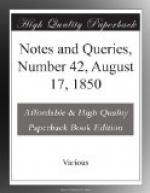When I am charged with an “entire want of acquaintance with the grammatical system” employed by Shakspeare, I might take exception to the omission of the words “as understood by Mr. Halliwell,” this gentleman assuming the very point in question between us. I believe he has paid particular attention to this subject; but he must not conclude that all who presume to differ from him “judge Shakspeare’s grammar by Cobbett or Murray.” And if I were disposed to indulge in as sweeping an expression, I should say that the remark excites a suspicion of the writer’s want of acquaintance with the spirit of Shakspeare’s works. I do not think so, though I think MR. HALLIWELL has formed his opinion hastily; and I think, moreover, that before I have ended, I shall convince him that it would not have been amiss had he exercised a little more reflection ere he began. In the passage in Othello, I object to the substitution of delighting or delightful for delighted, as weak epithets, and such as I do not believe that Shakespeare would have used. It was not as a schoolmaster or grammarian, but in reference to the peculiar fitness and force of his expressions, and his perfect acquaintance with the powers of the English language, and his mastery over it, that I called Shakespeare its greatest master.
But to return to the first passage I cited—that from Measure for Measure,—MR. HALLIWELL will be surprised to find that in the only remark I made {184} upon it as it stands he actually agrees with me. I said that the passage “in our sense of the term” is unintelligible. I still say so; and he who attempts to mend it, or modernise the form, says so too. The question next arises, Does he not mean no system, when he says system? Otherwise, why does he say that Shakspeare uses the passive for the active participle, when he explains the word not by the active participle, but by an adjective of totally different meaning? Is it not more likely that MR. HALLIWELL may have misunderstood Shakspeare’s system, than that the latter should have used intelligible words, and precise forms of words, so at random? And, moreover, does not the critic confound two meanings of the word delightful; the one obsolete, full of delight, the other the common one, giving delight, or gratifying?
Now by a violent figure which Shakspeare sometimes uses, delighted may mean delightful in the former sense; perhaps, rather, filled with delight. The word then would be formed directly from the noun, and must not be regarded as a participle at all, but rather an ellipsis, from which the verb (which may be represented by give, fill, endow, &c.) is omitted. Take, as an instance, this passage in Measure for Measure:—
“Clau. Death is a fearful thing!
“Isa. And shamed life a hateful.”




